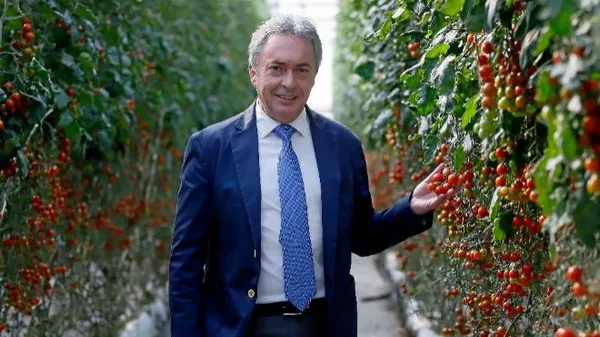The European tomato market is undergoing important changes, both in the productive potential and in consumer trends and preferences. How do you survive in an increasingly competitive market? Product diversification and the constant selection of varieties is one of the keys for Bonnysa, which in addition to producing and marketing around 35,000 tons of tomatoes per year, is finding great potential in the cultivation of tropical fruits, in fresh cut and ready-to-eat products and in table grapes, whose production has been resumed after 25 years.
Jorge Brotons, manager of Bonnysa Agroalimentaria.
"The more traditional Spanish tomato varieties are going through difficult times"
The company produces tomatoes throughout the year, although volumes are lower in the summer months. It currently exports 90% of its fresh production to the EU, with Germany, the United Kingdom and the Netherlands as the main destinations and a focus on the retail.
Although Spain has dominated the European markets in recent years, it is worth noting that third countries like Morocco and Turkey have achieved huge growth, gaining market share in Europe, and the Netherlands seems to be increasingly extending its campaign.
"The market share of Spanish tomatoes in Europe is indeed threatened," says Jorge Brotons, manager of Bonnysa. "We found that the rules of the game do not apply to everyone equally. There is permissiveness on third countries, which work with much lower standards when it comes to phytosanitary, environmental and labor issues. Spain is a country that strictly complies with regulations and it should demand that the rights and obligations be at the same level for everyone. At this time, with the sanitary crisis and the new post-COVID19 scenario, Europe should become stricter and protect its own producers. Our agricultural sector has to be strong and have the capacity for self-sufficiency. We shouldn't have to rely on third parties."
"Spanish tomatoes are going through difficult times. In our case, five years ago, we started focusing on new varieties in which the flavor and texture stand out, and which are currently the most demanded by consumers. These varieties require specialization and therefore have a greater value," says the manager of this company. "Bonnysa is trying at all times to be very quick in decision-making when it comes to tomatoes and their marketing, as well as very strategic in the medium term in the choice of those varieties, so as to continue being innovative," he says.
"We are growing table grapes again after 25 years"
Although tomatoes have been at the core of this company since 1956, they are betting on expanding their product range.
"We are tomato growers and that is what we want to continue being. What we have been doing for years is to diversify our product range. An example of this is that we are growing grapes again after 25 years. It is something that we already knew how to do, and we are cultivating only the sweet, seedless and super crunchy varieties. We have the license for some of the leading varieties in the sector and we started marketing them this year, with sales expected to grow exponentially in the coming years," says Jorge Brotons.
"We are facing the table grape project with great enthusiasm. We have the infrastructure, we have the varieties and we have a specialized team to carry it out," he says.
Becoming established with bananas and papayas. Possibility of breaking through with the pitahaya
"We have managed to become established as a leader in the banana sector with our Bondelicious brand, and also now with the Bonnysa brand. As for the papayas we grow in Tenerife, we have also consolidated ourselves in the European market, managing to compete against the Brazilian production. All this with a closer proximity to the markets, a lower carbon footprint and a much higher taste quality," says the manager of Bonnysa. "We are also looking into the cultivation of pitahaya as a new subtropical product."
"The fresh cut range is growing in every format and will continue to do so if things are done with honesty"
The company has spent years investing in the production of fresh cut and ready-to-eat products. "Customers are very careful with what they buy and they demand that the products not be processed as such. In our case, they are always transformed and that is one of our strengths. The ultra-processed ones are in the spotlight of experts and consumers and are increasingly rejected," says Brotons.
"Consumers want products that are easy to consume and accessible at any time. The fresh cut range is growing in every format, and will continue to do so if things are done with honesty, with no chemical additives or aggressive production processes," he says.
In its Development and Improvement Plant for Fruit and Vegetable Products, Bonnysa is works with different product lines.
"As for tomato derivatives, we have grated tomato -which this year was named Flavor of the Year in Spain-, our tomato juice drink and dried tomato. We also have our tomato Saborsada® and a new line of marinated tomatoes that will surprise consumers."
"Guacamole sales continue to increase, both in the domestic and the European markets. New, larger formats have been introduced and we continue working to expand the range of consumer formats. We are going to continue testing new products, some tomato-based, since we see that our products are always welcome because of their fresh and natural character, as they contain no additives or preservatives," says Jorge Brotons.
"The main advantage of these products is that they are always natural and fresh. This is part of our DNA and it is what the consumer increasingly demands. The challenge is to go further with natural products with a longer shelf life. Thanks to the use of technology, we know we can do it."
For more information:
Manuel Escoda
Bonnysa Agroalimentaria
M: +34 633 700 705
manuelescoda@bonnysa.es
www.bonnysa.es
